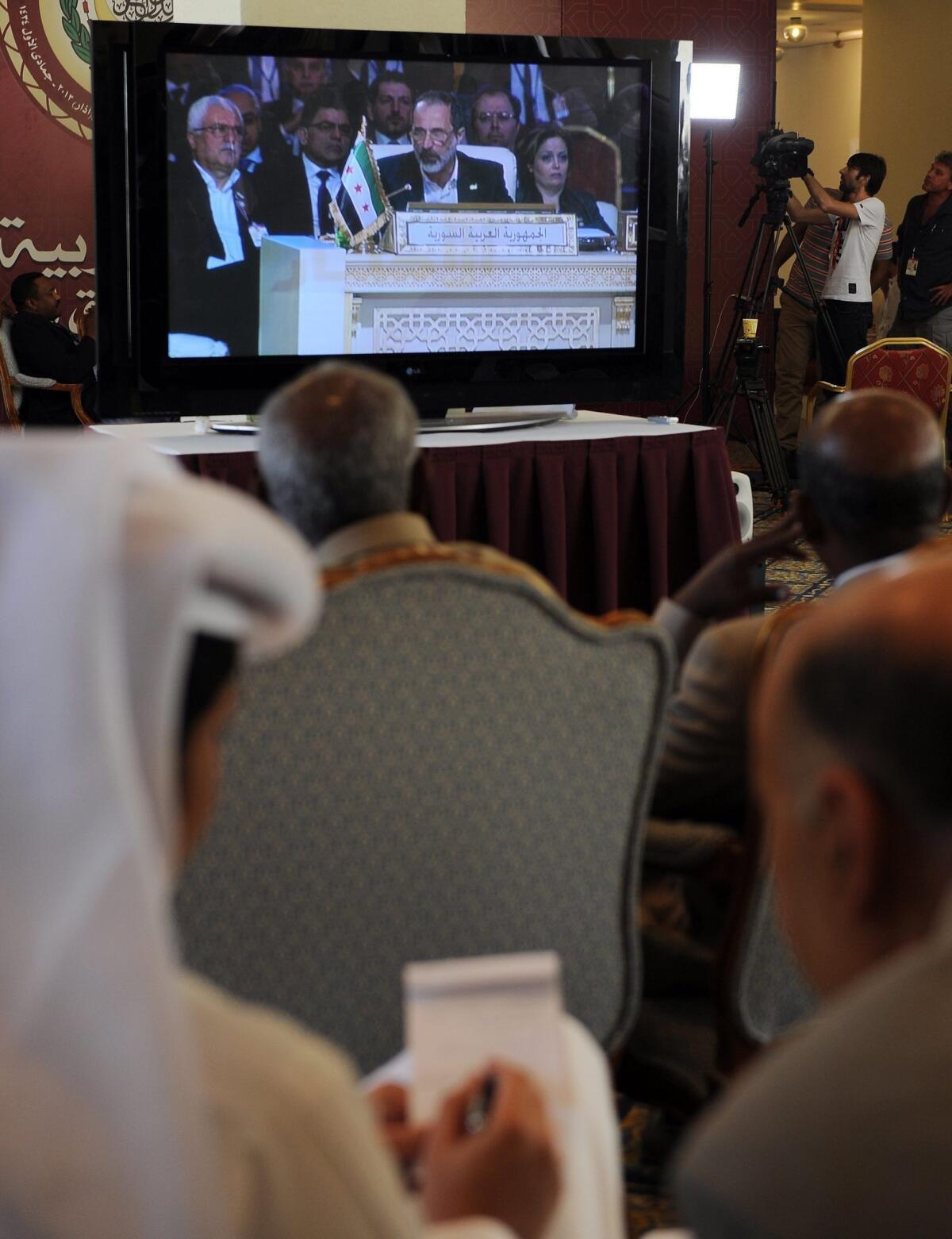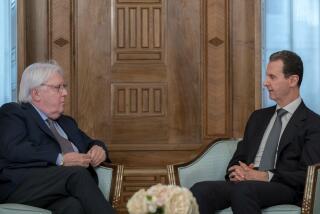Syrian opposition takes seat at Arab League, seeks Patriot missiles

BEIRUT -- A major Syrian opposition coalition took a seat as the legitimate government of Syria at an Arab League summit Tuesday, and the group’s outgoing leader promptly pushed for the United States to use Patriot missile-defense batteries against Syrian warplanes.
Moaz Khatib, who resigned from the opposition coalition on Sunday amid reports of deep divisions in its ranks, said he put the Patriot missile request to U.S. Secretary of State John Kerry during a meeting last month in Rome.
“I have asked Mr. Kerry to extend the umbrella of the Patriot missiles to cover the Syrian north and he promised to study the matter,” Moaz Khatib said in a speech, reported the Reuters news agency from Doha, where the 22-member Arab League was meeting.
Many nations have recognized the group Khatib led, the National Coalition for Syrian Revolutionary and Opposition Forces, as the legitimate representative of the Syrian people. The Arab League suspended Syria’s membership in late 2011 amid criticism of its crackdown on the rebellion against President Bashar Assad’s rule. It later handed over Syria’s seat to the opposition coalition, prompting an angry response from Assad’s government.
Use of Patriot missile batteries to shoot down or threaten Syrian air power would represent a major escalation of the conflict and would require NATO approval.
NATO says it has has deployed Patriot batteries inside Turkey along the Turkish-Syrian border as a protection from any incoming missile attacks from Syria. NATO has vowed that the weapons would only be used to defend Turkish soil, and not to strike targets in Syrian airspace.
The batteries were deployed earlier this year after a request from Turkey, which forms the eastern bulwark of the NATO alliance. Turkey had expressed alarm about apparently errant Syrian artillery shells landing in Turkish territory.
Syrian rebels have made major territorial gains inside Syria during the two year civil conflict but have been unable to counter the government’s monopoly on air power. The Syrian military has deployed jet fighters and helicopters to bomb and strafe opposition positions.
The Syrian government has denounced the deployment of Patriot missiles in Turkey as a hostile act that could further escalate tensions. Turkey’s principal allies, Russia and Iran, also assailed the Patriot missile deployment as a provocative move.
The NATO Patriot batteries deployed in the Turkish borderlands are from the United States, Germany and the Netherlands.
Khatib, a Damascus-based Islamic cleric and petroleum engineer, resigned his post Sunday as head of the western- and Persian Gulf-backed opposition group.
The dissident coalition has received financial and material support from outside nations, especially Qatar, Saudi Arabia and Turkey, all of which share the coalition’s goal of toppling Assad. The United States has also backed the group. Khatib has met with both Kerry and Vice President Joe Biden.
Media reports have indicated that Khatib’s surprise resignation from the coalition may be linked to his displeasure about the outsize influence of foreign nations, especially Qatar, in the Syrian exile group’s activities. Various external backers have tried to exert influence on the coalition and on the Syrian rebels fighting inside Syria.
Qatar and Turkey have worked closely with the Muslim Brotherhood, the Islamist organization, to exercise sway on opposition activities. Some dissidents have complained that the Muslim Brotherhood—which has been banned inside Syria for decades—has far too much power in the opposition bloc.
The Syrian government has denounced the coalition as a tool of gulf nations and Turkey.
ALSO:
U.N. withdrawing staff from Syria, citing danger
Syrian rebel commander badly hurt in car bombing
Syrian opposition leader Moaz Khatib resigns
More to Read
Sign up for Essential California
The most important California stories and recommendations in your inbox every morning.
You may occasionally receive promotional content from the Los Angeles Times.










